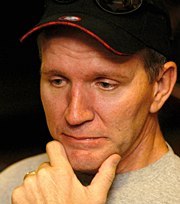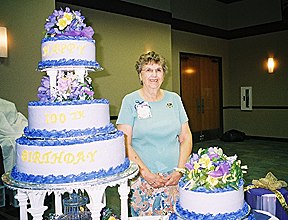Big family finds bigger family at South Texas Children’s Home_110104
Posted: 10/29/04
Big family finds bigger family at South Texas Children's Home
By George Henson
Staff Writer
BEEVILLE–When Meaghen Chandler is asked to share her Christian testimony, she tells people she owes her faith to a place where she never lived–South Texas Children's Home in Beeville.
Its ministry changed her mother's life, and its impact continues to be felt on a third generation.
Chandler's mother, Ann, was the 11th of 14 children born into the Dworaczyk family. The matriarch of the Polish Roman Catholic family died of toxemia during a 15th pregnancy, when the youngest child, Lil, was only about 18 months old.
| Lil Abshier, Lisette Brochon, and Meaghan Chandler all believe South Texas Children's home has played a big part in laying a strong foundation for the spiritual upbringing of infant Hannah. Abshier and nine of her siblings were raised in the Baptist home. (George Henson Photo) |
Their father “was overwhelmed by the whole thing,” said Lil Abshier, whose husband, Clif Abshier, is pastor of First Baptist Church in Bishop. “He spent a lot more time in the fields than he ever did at home.”
The oldest child was a son who had already left home to work in the oil fields. Raising the large family fell on the shoulders of the two oldest sisters.
They decided Lorine, age 17, was close enough to completing school that she should continue her education. That left much of the day-to-day management of the household to 15-year-old Georgia.
While they were doing their best to make a home, it was difficult, and Child Protective Services began to make regular visits to the home.
“It was rocking along, but not very smoothly,” Lil Abshier said.
While Georgia had to shoulder much of the everyday duties of running the household, Lorine was actively trying to find a solution to a situation that was “obviously not working.” Compounding the dilemma was a promise made to their mother on her deathbed that the children would not be split up.
“We had family around that would say, 'I'll take two girls,' or, 'Give me three of the boys' and things like that, but none could take all of them,” Abshier said.
It was the same for children's homes in the area. They would take the children, but only with the idea that they then would seek homes to adopt the children in any combination.
Lorine kept searching until a friend mentioned a new children's home that was just beginning in Beeville, the South Texas Children's Home.
The four youngest Dworaczyk girls moved into the first cottage built on the property in 1952. Lorine and Georgia, at 19 and 17, along with another brother, were too old. The six boys still young enough to come were put up in a hotel room with a chaperone until a cottage could be built to house them.
The 10 Dworaczyk children were among first 14 to be taken in by the children's home.
“When our world was falling apart, God was building another one for us in the brush country,” Abshier said with tears in her eyes, thinking of the blessing that began more than 50 years ago.
But all she relates about life before going to South Texas Children's Home is second- hand.
Her first memory was of the day she received the first new clothes of her lifetime. The 3-year-old was asked to model a dress, but rather than being excited, she stood atop the department store countertop as a frightened little girl.
“I knew I was going somewhere, and it wasn't home and that I probably wasn't ever going to go back home again.
“That was the last time I was ever scared, because that was the day I went to South Texas Children's Home, and it opened up a whole new world to me,” she recalled while wiping away tears.
| “For generations and generations to come the children’s home will impact our family." —Meaghan Chandler |
The children's home was in its own infancy. There was much work to do, in which the children participated. The first day the Dworaczyk boys were there, they were sent up into oak trees to remove moss from them.
“They used to grouse about the work, but now I think they realize that the people there knew we needed something to do to keep busy, especially during the transition,” Abshier said.
Life at the children's home was rich and full, she recalled. “We were given everything a child could want–a loving family life, clothing, meals, beds and a college education.”
While the children were sometimes in different cottages, they never lost their family bond, she added. “We all knew we were family, but we were now part of a bigger family.” Georgia and Lorine also visited from time to time, and even took some of the children home with them for short periods.
Rescuing the children from a life of turmoil and giving stability to their lives was not the children's home's greatest gift to the family, Chandler said. The greatest gift was a spiritual foundation. Her mother made a profession of faith in Jesus Christ at the South Texas Children's Home and later led her husband to follow Christ as well.
“That allowed me to grow up in a Christian home, attend a Christian school at Hardin-Simmons University and marry a pastor. None of that would have happened if she hadn't been given the opportunity to go the South Texas Children's Home,” she said.
Chandler now also has a daughter, Hannah, born Sept. 7, to pass that spiritual heritage on to. Her husband, Ross, is pastor of First Baptist Church in Hondo.
“For generations and generations to come, the children's home will impact our family. Not a day goes by that I don't realize how my relationship with Christ has been impacted by the children's home,” she added.
Her cousin, Lisette Brochon–Lorine's daughter–also is now a Baptist, although her mother has stayed true to her Catholic roots. Bronchon said the reason she is a Baptist is because of the strong influence of the 10 children who attended South Texas Children's Home and their children.
“Everybody who went to the children's home was spiritually fortified in a way that has led to my generation accepting Christ,” she said. “They seem to know that there is something to stand for–and more than any other family I know of.”
“My mother is still very much a Catholic, and I don't think I would be saved to this day if they hadn't been such a large, strongly believing family. I just wouldn't have been exposed to it,” Brochon said.
Abshier said the reason for their strong belief is obvious to her.
“Everybody who went to South Texas Children's Home knew that God had given them a new life, and they needed to give it back to him,” she said. She has given hers back to the children's home itself. She has been employed there the past 25 years, now as campus coordinator of the children's home's Corpus Christi branch.
“The question we all have asked ourselves many times is what would have happened to us if there hadn't been a South Texas Children's Home. What if those people hadn't been faithful to the vision God had given them?
“What we realize now is the question really is, 'What if I'm not faithful?' We all need to be faithful to what we are to do. We need to see the vision continue,” Abshier said.
"Many other children are now in situations where their lives will either grow to be testimonies to God's grace, or their lives will deteriorate to just shambles. We have to carry on the vision."




